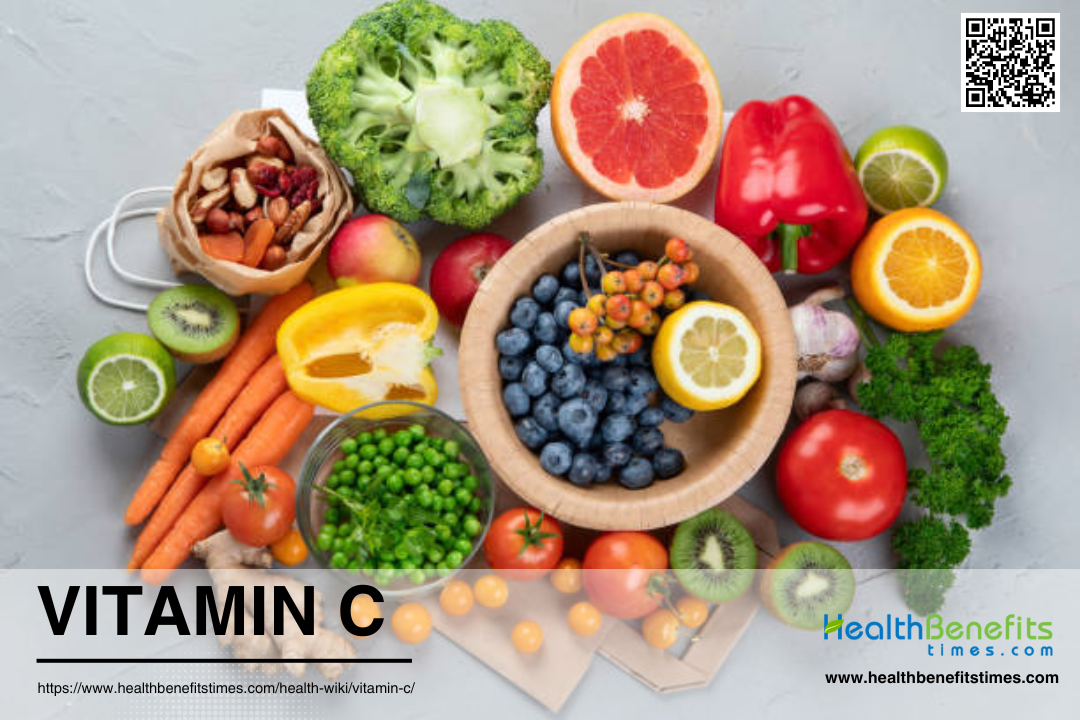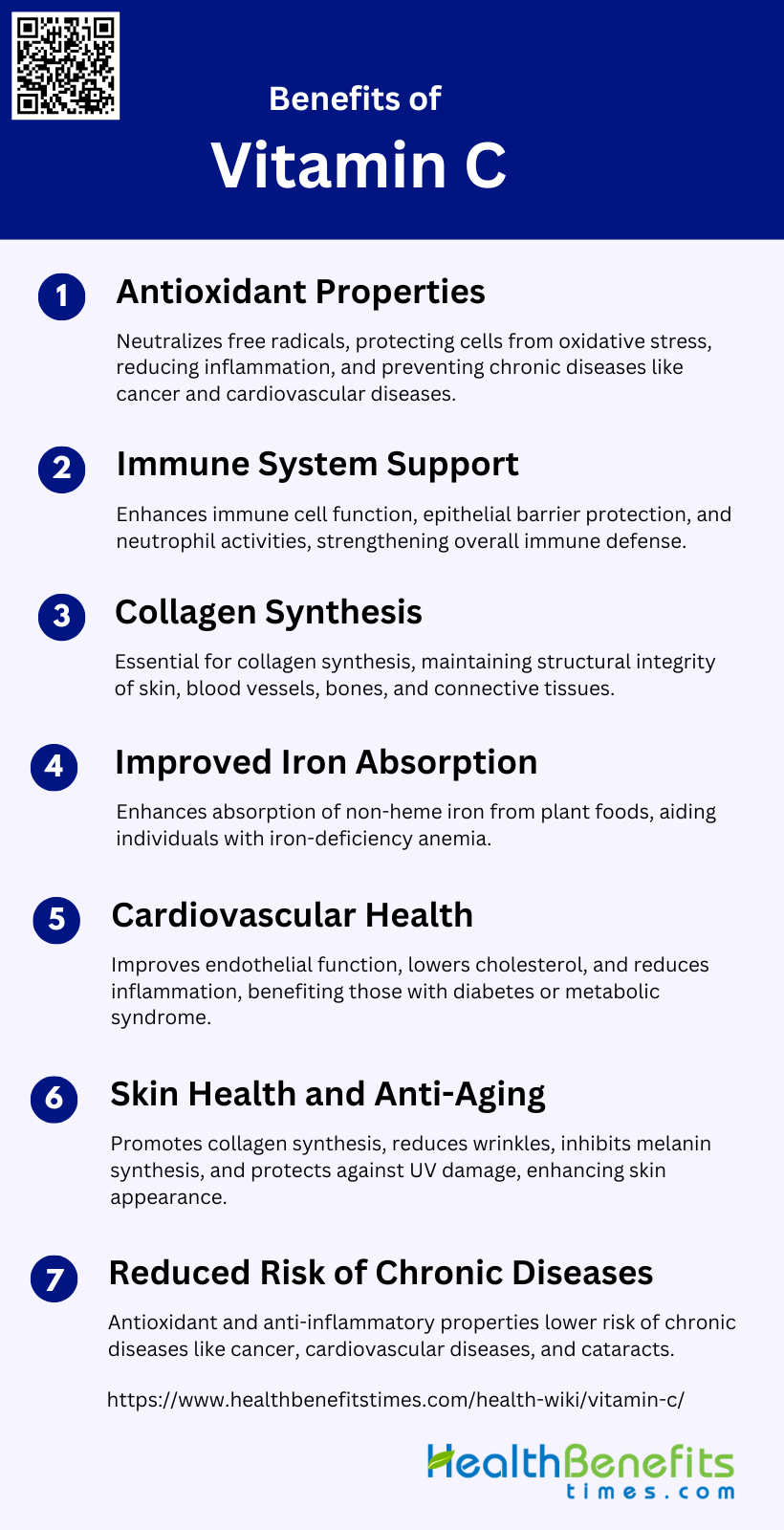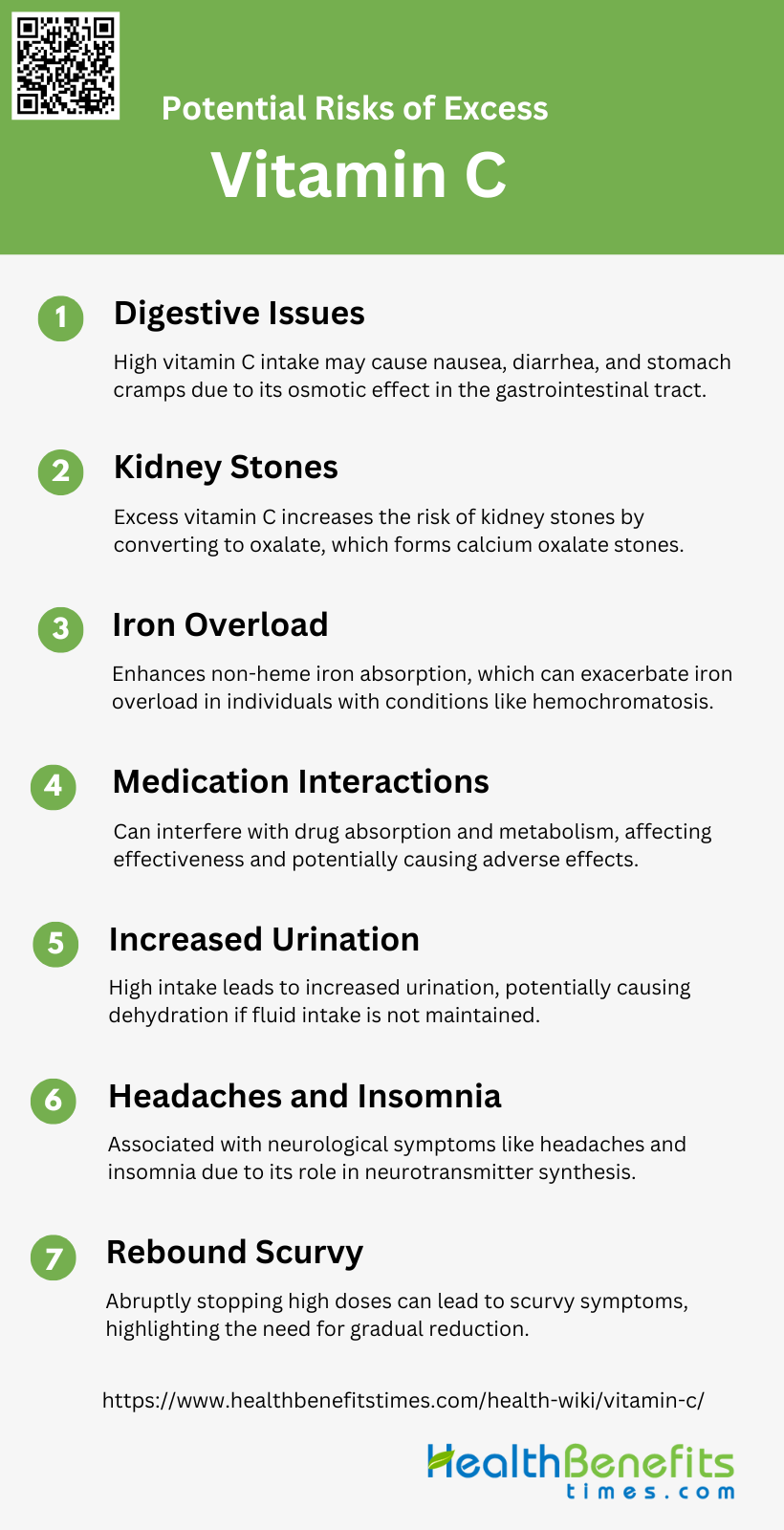Vitamin C, also known as ascorbic acid, is a vital nutrient that plays several crucial roles in the human body. It is a powerful antioxidant, helping to protect cells from damage caused by free radicals. Vitamin C is essential for the synthesis of collagen, a protein necessary for the health and repair of skin, blood vessels, bones, and other tissues. Additionally, it enhances the absorption of iron from plant-based foods and supports the immune system by promoting the production and function of white blood cells. Humans cannot synthesize vitamin C endogenously, so it must be obtained through diet, with rich sources including citrus fruits, strawberries, bell peppers, and broccoli.
Sources of Vitamin C
Vitamin C is a crucial nutrient that supports various bodily functions, including immune defense and skin health. It can be obtained from a variety of sources, including fruits, vegetables, and supplements. Below are some of the best sources of Vitamin C to consider incorporating into your diet:
1. Fruits
Fruits are a rich source of Vitamin C, with some of the highest concentrations found in oranges, strawberries, kiwi, and guava. Oranges, for instance, have been shown to have significant seasonal variability in their Vitamin C content, with higher levels typically observed in winter. Kiwi, particularly the SunGold™ variety, has been demonstrated to significantly improve plasma Vitamin C levels and overall well-being in individuals with low Vitamin C status. Guava is another fruit that has been used in clinical trials to assess its efficacy in improving Vitamin C levels, particularly in patients with chronic conditions like periodontal disease and diabetes mellitus. These fruits not only provide essential nutrients but also contribute to overall health and vitality.
2. Vegetables
Vegetables such as bell peppers, broccoli, Brussels sprouts, and spinach are also excellent sources of Vitamin C. For example, broccoli can be biofortified to increase its Vitamin C content significantly, making it an even more potent source of this essential nutrient. Spinach shows considerable seasonal variation in its Vitamin C levels, with the highest concentrations typically found in winter. Bell peppers and Brussels sprouts are also known for their high Vitamin C content, contributing to a balanced diet that supports immune function and overall health. These vegetables are not only nutritious but also versatile, making them easy to incorporate into various meals.
3. Supplements
Vitamin C supplements are widely available and can be an effective way to ensure adequate intake, especially for individuals who may not consume enough fruits and vegetables. Supplements come in various forms, including tablets and capsules, and are often used to address deficiencies or support overall health. Studies have shown that Vitamin C tablets can improve well-being and reduce fatigue in individuals with low Vitamin C levels. However, it is important to consider that whole foods may offer additional benefits beyond just Vitamin C, as seen in the case of kiwifruit, which provided more comprehensive improvements in vitality compared to supplements alone. Therefore, while supplements can be beneficial, they should ideally complement a diet rich in natural sources of Vitamin C.
Benefits of Vitamin C
Vitamin C is an essential nutrient that plays a vital role in maintaining overall health. It supports immune function, promotes healthy skin, and aids in the absorption of iron from plant-based foods. Here are some key benefits of Vitamin C:
1. Antioxidant Properties
Vitamin C is a potent antioxidant that helps neutralize free radicals, thereby protecting cells from oxidative stress and damage. This antioxidant action is crucial in preventing cellular damage that can lead to chronic diseases such as cancer and cardiovascular diseases. Vitamin C’s ability to donate electrons makes it effective in scavenging reactive oxygen species, thus reducing inflammation and oxidative stress in the body.
2. Immune System Support
Vitamin C plays a vital role in supporting the immune system. It enhances the function of various immune cells, including neutrophils, lymphocytes, and phagocytes. Vitamin C supports epithelial barrier function against pathogens and promotes the oxidant scavenging activity of the skin, thereby protecting against environmental oxidative stress. It also enhances the chemotaxis, phagocytosis, and microbial killing capabilities of neutrophils, contributing to a robust immune defense.
3. Collagen Synthesis
Vitamin C is essential for collagen synthesis, a critical component of connective tissues. It acts as a cofactor for prolyl hydroxylase and lysyl hydroxylase, enzymes involved in stabilizing and cross-linking collagen fibers. This process is vital for maintaining the structural integrity of skin, blood vessels, bones, and other tissues. Adequate vitamin C levels are necessary to prevent scurvy, a disease characterized by weakened collagen structures.
4. Improved Iron Absorption
Vitamin C enhances the absorption of non-heme iron from plant-based foods by reducing ferric iron (Fe3+) to ferrous iron (Fe2+), which is more readily absorbed in the intestine. This property is particularly beneficial for individuals with iron-deficiency anemia, as it helps increase iron bioavailability and improve overall iron status. The facilitation of iron absorption by vitamin C is a well-documented physiological role.
5. Cardiovascular Health
Vitamin C contributes to cardiovascular health by improving endothelial function and reducing oxidative stress. It helps lower total cholesterol levels and reduces markers of inflammation and oxidative stress, such as C-reactive protein and interleukin-6. These effects are particularly beneficial for individuals with diabetes or metabolic syndrome, as they are at increased risk of cardiovascular diseases. However, more research is needed to solidify these findings.
6. Skin Health and Anti-Aging
Vitamin C is widely recognized for its benefits to skin health and anti-aging. It promotes collagen synthesis, which helps thicken the skin and reduce fine lines and wrinkles. Additionally, vitamin C acts as a depigmenting agent by inhibiting melanin synthesis, thereby reducing hyperpigmentation. Its antioxidant properties also protect the skin from damage caused by UV radiation and environmental pollutants, contributing to a more youthful appearance.
7. Reduced Risk of Chronic Diseases
Vitamin C’s antioxidant and anti-inflammatory properties contribute to a reduced risk of chronic diseases such as cancer, cardiovascular diseases, and cataracts. By neutralizing free radicals and reducing oxidative stress, vitamin C helps prevent cellular damage that can lead to these conditions. Although the evidence from human studies is not always consistent, the potential benefits of vitamin C in reducing the risk of chronic diseases are supported by various animal and cell culture studies.
Vitamin C Deficiency
Vitamin C deficiency is a significant global health concern, affecting both low- and middle-income countries as well as specific subgroups within high-income countries. This deficiency can lead to severe health issues, including impaired immune function, increased susceptibility to infections, and neuropsychiatric effects such as depression and cognitive impairment. In early postnatal life, vitamin C deficiency can impair neuronal development and spatial memory, as evidenced in studies on guinea pigs. The prevalence of vitamin C deficiency in the United States highlights the need for increased dietary intake and supplementation, particularly among high-risk groups such as smokers and non-Hispanic Black males. Overall, addressing vitamin C deficiency through dietary recommendations and supplementation could mitigate its adverse health effects and improve overall public health outcomes.
Symptoms
Vitamin C deficiency manifests through a variety of symptoms, primarily due to its role in collagen synthesis and antioxidant functions. Common symptoms include fatigue, which is often the earliest sign, resulting from impaired energy metabolism and increased oxidative stress. Bruising and easy bleeding are also prevalent, caused by weakened blood vessels and capillary fragility due to defective collagen. Gum inflammation, or gingivitis, is another hallmark symptom, characterized by swollen, bleeding gums and poor wound healing. Additional symptoms may include myalgias, arthralgias, perifollicular hemorrhages, and coiled body hair.
Scurvy
Scurvy is a severe form of Vitamin C deficiency that has significant historical importance. It was first identified in the 16th century, primarily affecting sailors who lacked access to fresh fruits and vegetables during long sea voyages. James Lind, a naval surgeon, conducted one of the first clinical trials in 1747, demonstrating that citrus fruits could cure scurvy, leading to the Royal Navy’s adoption of lemon juice to prevent the disease. Scurvy presents with symptoms such as severe fatigue, bleeding gums, joint pain, and skin bruising, and if left untreated, it can be fatal. Despite being rare in modern developed countries, scurvy still occurs in at-risk populations such as the elderly, alcoholics, and those with poor nutrition.
Potential Risks of Excess Vitamin C
While Vitamin C is essential for health, consuming it in excessive amounts can lead to adverse effects. Overconsumption may cause digestive issues and interact with certain medications. Here are some potential risks of taking too much Vitamin C:
1. Digestive Issues
Excessive intake of vitamin C can lead to various digestive issues, including nausea, diarrhea, and stomach cramps. These symptoms are often a result of the vitamin’s osmotic effect in the gastrointestinal tract, which draws water into the intestines and leads to loose stools. Additionally, high doses of vitamin C can cause abdominal pain and vomiting, which are common side effects reported in individuals consuming more than the recommended daily allowance.
2. Kidney Stones
High doses of vitamin C have been linked to an increased risk of kidney stones, particularly in men. Vitamin C is metabolized into oxalate, which can combine with calcium to form calcium oxalate stones. Studies have shown that men who consume high doses of vitamin C supplements have a significantly higher risk of developing kidney stones compared to those who do not take supplements. This risk is dose-dependent, with higher doses correlating with a greater likelihood of stone formation.
3. Iron Overload
Vitamin C enhances the absorption of non-heme iron from plant-based foods, which can be beneficial for individuals with iron deficiency. However, in people with conditions like hemochromatosis, where iron accumulates in the body, excessive vitamin C can exacerbate iron overload. This can lead to tissue damage and increase the risk of conditions such as liver disease, heart problems, and diabetes. Therefore, individuals with iron overload disorders should be cautious with vitamin C supplementation.
4. Medication Interactions
Vitamin C can interact with various medications, potentially altering their effectiveness or increasing the risk of adverse effects. For instance, high doses of vitamin C can interfere with the absorption and metabolism of certain drugs, such as chemotherapy agents and anticoagulants. Additionally, vitamin C can affect the results of some clinical laboratory tests, leading to misdiagnosis or inappropriate treatment. Patients on medication should consult healthcare providers before taking high doses of vitamin C.
5. Increased Urination
One of the less severe but notable side effects of high vitamin C intake is increased urination. This is because vitamin C is water-soluble, and the body excretes excess amounts through urine. While this is generally not harmful, it can be inconvenient and may lead to dehydration if fluid intake is not adequately maintained. Therefore, individuals consuming high doses of vitamin C should ensure they drink plenty of water to stay hydrated.
6. Headaches and Insomnia
Excessive vitamin C intake has been associated with neurological symptoms such as headaches and insomnia. These symptoms may be due to the vitamin’s role in neurotransmitter synthesis and its potential to cause oxidative stress when taken in large amounts. Some individuals report experiencing moderate to severe headaches and difficulty sleeping when consuming high doses of vitamin C. These side effects highlight the importance of adhering to recommended dosages.
7. Rebound Scurvy
Rebound scurvy is a condition that can occur when high doses of vitamin C are abruptly discontinued. The body becomes accustomed to the high levels of the vitamin, and a sudden drop can lead to symptoms of scurvy, such as fatigue, joint pain, and bleeding gums. This phenomenon underscores the need for gradual reduction in vitamin C intake rather than an abrupt cessation, especially for individuals who have been taking large doses for an extended period.
How Much Vitamin C Do You Need?
Understanding the appropriate amount of Vitamin C for different age groups and special populations is essential for maintaining optimal health. The recommended daily intake varies based on factors such as age, gender, and specific health conditions. Here are the guidelines for Vitamin C intake:
1. Recommended Daily Intake of Vitamin C for Adults and Children
The recommended daily intake (RDI) of vitamin C varies by age and gender. For healthy adult men, the RDI is generally set at 90-110 mg/day, while for women, it is around 75-95 mg/day. Children and adolescents have lower requirements, with recommended intakes ranging from 20 mg/day for infants to 85 mg/day for older children. These values are designed to maintain adequate plasma levels of vitamin C and prevent deficiency diseases like scurvy. Some studies suggest that higher intakes, up to 200 mg/day, may offer additional health benefits, such as enhanced immune function and reduced risk of chronic diseases.
2. Special Populations (Pregnant Women and the Elderly)
Special populations, such as pregnant women and the elderly, have different vitamin C requirements. Pregnant women are advised to increase their intake to around 105 mg/day from the fourth month of pregnancy, and lactating women should aim for 125 mg/day to support both their own health and that of their baby. The elderly, who may have reduced absorption and increased oxidative stress, often require higher intakes as well. Studies suggest that elderly men and women should aim for 150 mg/day and 75 mg/day, respectively, to maintain optimal plasma levels and support overall health. These increased requirements help to mitigate age-related declines in immune function and other health issues.




